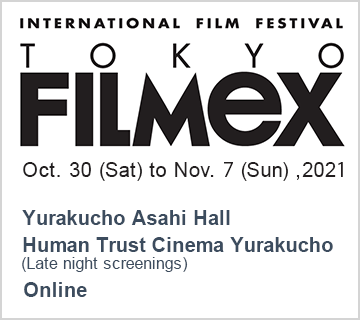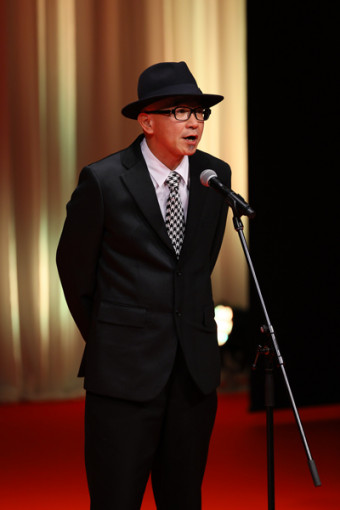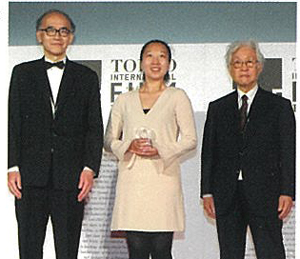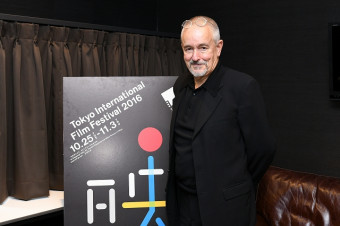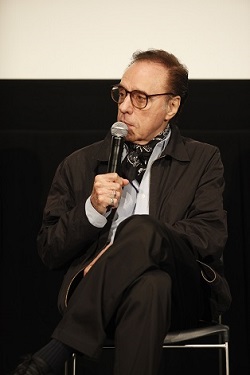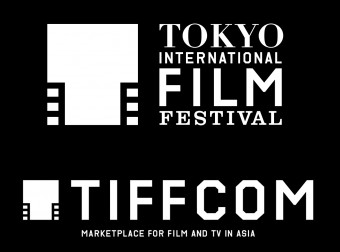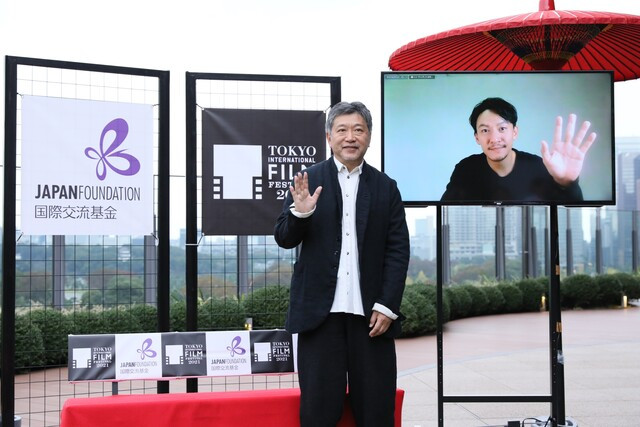
The second Conversation Series at Asia Lounge got underway on November 1 in a beautiful outdoor garden at Tokyo Midtown Hibiya, one of the new venues at the 34th Tokyo International Film Festival (TIFF). Taking advantage of the blue skies, acclaimed filmmaker Kore-eda Hirokazu sat outside next to a red parasol, with Tokyo’s skyline unfolding in the background.
A co-presentation of the Japan Foundation and TIFF, with an advisory panel once again headed by Palme d’Or winner Kore-eda, the series is bringing together acclaimed filmmakers from Asia and beyond to engage in friendly dialogue with their Japanese counterparts each afternoon through November 7. Due to the ongoing pandemic, the Asia Lounge features both in-person and online guests, with audiences able to livestream each of the talks.
Kore-eda began his discussion with heralded Taiwanese actor Chang Chen, who was zooming in from Taipei, by mentioning that they’d not ever had the opportunity to sit down together and have a long chat. “Last time we had this kind of setup was at the Cannes Film Festival afterparty for my film Shoplifters,” he recalled, “and you mentioned a scene in the film that had impressed you greatly. At that time, Denis Villeneuve was sitting next to you. [The men were both on the 2018 Cannes Jury.] Jury members spend a lot of time together during film festivals, and I wondered if you wound up working with him [on the new blockbuster Dune] because you’d gotten to know each other during jury duty at Cannes?”
Responded Chang, “You get to meet people at festivals that you don’t normally see, and have a lot of opportunities to talk. In those two weeks together, all the jury members became very friendly. I think this is something unique to festivals. At that time, Mr. Villeneuve didn’t say anything [about working together]. But he contacted me after that.”
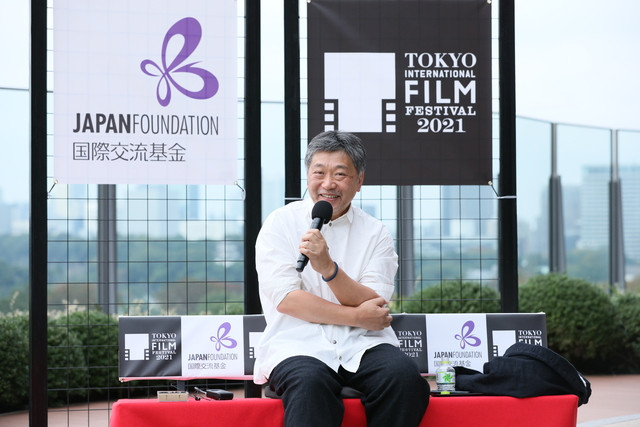
Chang makes his Hollywood debut in the sci-fi epic, in which he is the first Asian actor to portray Dr. Wellington Yueh. Just out in theaters, Dune is expected to expand Chang’s fan base further, and Kore-eda mentioned that the Japanese press had even reported that he’d moved to the U.S. (which he said he has not).
“You’ve had a lot of opportunities to work with directors in other countries, including in Japan,” Kore-eda said, “but do you work across borders a lot? ‘Crossing borders’ just happens to be the theme of our festival this year.”
Said Chang, expanding on the initial question concerning jury duty, “I had my first international festival experience at TIFF. To me, film festivals are places where people who are related to and love films gather. They have a unique atmosphere, and you get a chance to meet a lot of people from other countries who are also working in the film industry. It’s not that I’ve intentionally sought out opportunities to work abroad, but I feel that working overseas gives you the chance to learn more, to have new experiences and to make new discoveries, so it’s a great experience for me.”
Asked what he remembered about that first time at TIFF, Chang recalled, “I don’t remember much, but I think I went to Tokyo Disneyland after the festival was over. And the second time I was at TIFF, I remember it was for Edward Yang’s Mahjong (1996), and for 8 to10 hours, Mr. Yang had to answer questions during interviews set up by the Japanese distributor. I had a lot of photo shoots, and that really impressed me. I realized there were major differences between the way films are promoted in Taiwan and Japan, as well as in China. How they plan the schedule is also different. In China, it’s mostly through TV promotion, not in magazines.”
Kore-eda commented, “It’s often said that Edward Yang’s A Brighter Summer Day (1991) is one of the best Asian films. TIFF actually picked it up earlier than other film festivals, by the way, so I think TIFF should boast more about that. Can you tell us a little about working with Mr. Yang on A Brighter Summer Day? I guess you were 14 years old at the time. I made the film Nobody Knows with Yagira Yuya, who was also 14 at the time, and it was an important film for both of us. Looking back on that, you’ve said that you were scolded a lot by Mr. Yang. Why was that?”
“Edward Yang was preparing A Brighter Summer Day for two years before the shoot,” explained Chang, “but couldn’t find the right actor for the protagonist. The producer knew my father, and he took me to the shoot. [Chang’s father, Chang Kuo-chu, was cast to play his father in the film after Chang Chen was hired to portray protagonist Xiao Si’r.]
“In the film, there’s a scene where they’re shooting billiards and the kids get into a fight. Some people actually got hurt. When Mr. Yang saw that, he was very surprised, and I was taken away and scolded. He told me that I wasn’t serious enough about acting, and they were going to punish me. So I have to stand there, in a dark room facing the wall. After 30 minutes, they turned the lights back on and took me back to the set. I didn’t understand why I was scolded, but now I realize the director wanted to capture a [more realistic] response to the fight and injury.”
Kore-eda remarked, “As a director myself, I guess you had a certain relationship with Edward Yang in which he knew he didn’t have to worry about intimidating you. In those two years of preparation, were you rehearsing or doing improvisation? How did you spend that time?”
Recalled Chang, “There was a little over a year, and I was able to work with an acting teacher, learning how to act, how to move, how to read lines, how to breathe—that’s the kind of lessons I was taking. There were other young actors studying with me, and interacting with them was part of the training process. To be able to work with the other young actors allowed us to get to know each other. I was very much an amateur, so I was able to take lessons and learn, and we all got along well. We knew each other by the time we began shooting.”
“You did an interview in which you said that the turning point of your career occurred with Gong Li [in Wong Kar-wai’s 2004 Eros],” said Kore-eda. “You called it a beautiful, sad film. What made you feel it was a turning point for you?”
“In my career, at that time I started thinking about how I was going to move forward,” responded Chang. “What direction should I go in? I was concerned about the future. I was making one film every two years, and had some anxiety about my career. I hadn’t come across an actress like Gong Li before. She was so good at expressing her inner emotions. Her acting was superb, just amazing. There were scenes when the camera was following her and swirling around her, and she was acting in that environment. I could see her emotions just by her body movement. I realized that was one way of acting—the camera captures body language as well as dialogue. That’s why it was a turning point.”
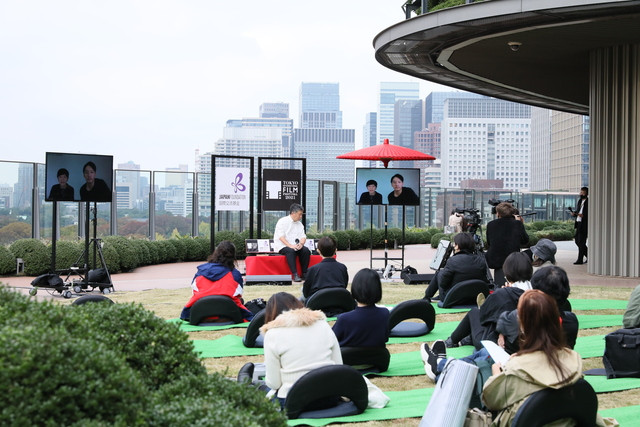
Commented Kore-eda, “The way you created such harmony, blending into each other in that film, makes it seem like you must have indeed had intimate moments together. As for working with Wong Kar-wai, which you’ve done often, I’ve heard rumors that you don’t know what he’s going to be shooting from day to day, that you go to the set without knowing what he’ll shoot. I think that must make it very fresh and stimulating. Were there moments in which you were surprised by him?”
Chang laughed. “Wong Kar-wai has a process. It’s a process of change. My first film with him was Happy Together (1997), and they’d been shooting in Argentina for 5 months already when I went. The first day I got there, Wong told me to listen to some music. He was telling me I was from this region, and I was that type of guy. I’d never worked with anyone but Edward Yang before, where you start with the script and aren’t allowed to change anything. Everything has meaning to it and the actor must understand the meaning of the dialogue.
“So when I worked with Wong Kar-wai, at first it was difficult to adapt. I had to imagine everything myself and create my own role. He’s the type of person for whom feeling is very important, and he watches actors very closely. So I had to act without a script, and it was very interesting for me. My scenes were a small part of the film. I came to like Wong Kar-wai’s tempo of working because Edward Yang never let us do as we liked, and this was the opposite. I had to make a lot of decisions myself, and never knew what the set would be like. I’ve never worked with you, Mr. Kore-eda. What is your approach?”
Kore-eda’s answer is every actor’s dream: “I think about the actor, and decide which type of approach would draw out the performance I need,” he said. “If an actor wants to explore the character at the location, that’s fine. I don’t have a set style of directing, I adjust it to accommodate the actors.”
He then switched to a favorite topic, Hou Hsiao-Hsien, whose work speaks to him deeply because his father lived in Taiwan, and Kore-eda feels the spirit of his father’s past whenever he watches Hou’s films. “Let me ask you about working with Hou Hsiao-Hsien, whose films I just love, especially on the film Three Times [2005]. There’s a scene set in a billiards hall in the 1960s. Everything about that scene is wonderful. How was it to work on that?”
“It was the first time I’d worked with the director,” said Chang, “and I had to start from zero, getting to know his style. You don’t know where he wants to put the camera or when he’s going to start rolling. He gave me a few pages of what we would shoot the next day when I went home each night, but I didn’t have the whole picture. If the scene was in a room, he’d tell me to sit in a chair and act any way I liked. We don’t know how the scene was being shot, so it was a little confusing at first.”
“My costar Shu Qi had worked with him once before, and also had some unusual experiences with him. The billiards scene you mention was actually the final shot in the film. There was a certain feeling by then that the crew knew exactly what the whole story was about, but for me, it was difficult to figure out what Hou Hsiao-Hsien was expecting. He’s not clear about that. If he doesn’t like a certain scene, he doesn’t explain why he didn’t like it, and we have to imagine what it was he thought was wrong. He probably feels that his way is the right way, and after I’d gotten more used to it, I would try to sense what he was after.”
Kore-eda mentioned another scene in the film, “when you’re smoking outside the billiards hall with Shu Qi, eating something from a bowl, maybe wonton, and you’re not talking to each other at all. The audience is wondering what’s going to happen next with these two, and I liked that scene so much. Do you remember shooting that?”
Chang laughed heartily. “I remember it was very dark, and on Hou Hsiao-Hsien’s sets, he didn’t give us anything to eat. So I remember that there was a warm, thick soup with some meat, maybe. We’d not had anything to eat up to that point, so shooting that scene in the dark was over too quickly.”
Recalled Kore-eda, “I remember going to an Edward Yang set in the early 1990s, where I saw him explaining everything carefully to his crew, especially the young ones. He was like a master, a wonderful teacher. I think the people on that crew are now driving the Taiwanese film industry. What do you envision for the future of the industry?”
Chang thought for a moment before saying, “It’s about what kind of films we can make. The important thing is to make a variety of films. Audiences have different likes and dislikes, so I hope we can make films for every taste. There are a lot of filmmakers from different generations, and they’re making films that speak to their generation. I think films can change people’s lives. With many films now online, I think the content will change, but I don’t think the inherent qualities of film will change. I feel that we have to keep upping our game to satisfy everyone, and I’m really honored to be an actor. I have confidence in my ability to do this job.”
Guest Speakers: Chen Chang (Actor), Moderator: Kore-eda Hirokazu (Filmmaker)
Conversation Series at Asia Lounge
Co-presented by The Japan Foundation Asia Center & Tokyo International Film Festival






